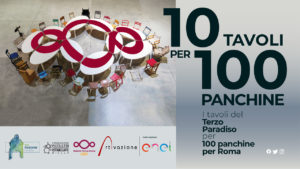Making cities and human settlements inclusive, safe, long-lasting and sustainable: this is what Goal 11 of the United Nations 2030 Agenda outlines. A global target that finds nourishment in individual, collective and community practices. An example is the Rebirth Forum Rome, which since January 2019 has brought together around the Tables of the Third Paradise 89 representatives of organisations from all sectors of the social fabric to listen, discuss and find practical solutions to overcome the problems of the capital; a process of social interest inspired by the Third Paradise and Cittadellarte’s demopractic method. The initiative proved to be a successful participation: the Rebirth Forum was followed by working sites with dedicated meetings for 14 months (first at the Macro Asilo and then at the National Gallery of Modern Art), during which a series of ideas and projects resulting from collective dialogue blossomed.
One of these is 100 benches for Rome (all the details in our previous article), a participatory, socially useful, low-environmental-impact project, which involves the installation of one hundred benches made of recycled plastic in different areas of Rome; in this regard, we remind you that until 30th April it is possible to make a donation – of at least 10 euros – for the collective benches through the crowdfunding campaign on Produzioni dal Basso. To complement the project, the coordinator of the Rebirth/Third Paradise ambassadors Saverio Teruzzi has proposed 10 tables for 100 benches, an initiative articulated around interviews with various actors and representatives from territorial or institutional organisations in Rome. “It is an opportunity to talk about culture and active citizenship,” he said, “as if we were at the tables of the Forum. From this point of view, the transition from the Forum to the working sites, from tables to chairs to benches is significant, also inspired by the 11th Goal of Sustainable Development“.

The name of the initiative is a clear reference to the Table of the Third Paradise, a work created in 2018 by Michelangelo Pistoletto in collaboration with Teruzzi: “For the Rebirth Forum,” Saverio said, “we asked the participants to bring a chair that had to have already been used, whether it came from the reference organisation or from the participant’s home. The link between the projects? Michelangelo Pistoletto has explained the meaning of the shift from the chair to the bench: while previously the representatives from the organisations had brought their knowledge and experiences to a single seat, these tables have created the opportunity to stretch these seats to benches, which can not only accommodate more people, or at least this is the hope when the pandemic allows it, but have become the emblem of several organisations choosing to work jointly for a common good”.
We are now publishing the first video interview conducted for 10 tables for 100 benches. The guest is Giorgio de Finis, artistic director and curator of the Museum of the Suburbs.
Why invest in culture?
It is common misconception that culture is superfluous, something we add to the essence of living that precedes philosophising, but this is not the case. It is no coincidence, in fact, that we consider man a cultural animal. Culture is our being human.
Centre and suburbs
It is an duality that we should perhaps overcome. But it is important to remember that each of us, as a singularity, is always a centre. So, when someone wants us to become a suburb, this being ‘centre’ must be claimed. On the other hand, it is important to become a little more ‘peripheral’, that is to complete the Copernican revolution and welcome our role as humans on Earth in a less violent and less aggressive way, associating with other forms of life.
The Museum of the Suburbs
It is a multidisciplinary study centre with an international vocation. It tries to understand what a city is in the third millennium, which is the ecosystem favoured by sapiens, 50% + 1 of whom have decided to live in metropolises and megalopolises. On the other hand, it is also a centre dedicated to art, where we study what the suburbs and the city are, but with the freedom to erase the blackboard and start redrawing, because this is what art and artists are invited to do.
The Festival of the Suburbs
The festival is an attempt to give a voice to the many suburbs of Rome and other cities. It will be a hybrid, phygital, i.e. half physical, half digital, event. We will try to talk about Rome and our suburbs, which are not just drug-dealing squares or sad and grey places, but contexts where extraordinary experiments of resilience are born. We will also focus on the suburbs of the other cities with which we will be in contact.
A definition for Rome and its future
The best definition of Rome is to make it plural, ‘Romes’, as I have proposed several times. The key word could therefore be inclusiveness, for a city that can once again be cosmopolitan, crossbred, open and fairer.

